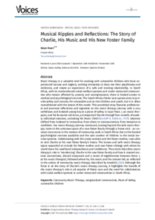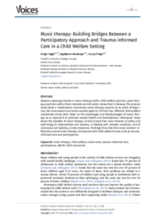Displaying 191 - 200 of 525
Utilizing case examples, this discussion paper examines foster care decisions that disrupt important child-caregiver relationships.
This manuscript relies on two studies to learn more about the experience of adolescent-aged foster youth who utilize long-term mental health services coordinated through A Home Within, a national nonprofit committed to reducing treatment barriers by asking licensed therapists to provide pro bono therapy “for as long as it takes.”
This paper discusses two key strategies detailing how “relationship-focused” and “trauma-informed” intervention practices, which form the basis of an Australian therapeutic program called Treatment and Care for Kids (TrACK), made a difference in the lives of highly traumatised children.
The purpose of this paper is to examine the importance of social support for foster parents, in regards to confidence and satisfaction, as well as perceived challenges with fostering.
This anecdotal story features professional and personal reflections and vignettes on the music therapy journey with a very withdrawn and isolated young boy at a place of safety in Cape Town, South Africa.
Despite a growing interest in music therapy within child welfare practice, music therapy practices within these contexts are still under-researched in Norway. The present study takes a collaborative community music therapy practice as its point of departure.
The aim of this study was to examine associations between mindfulness and psychological factors (i.e., depression, cognitive function, positive emotion, and negative emotion) among adolescent orphans in children's care homes in India.
The present study analyzes differences between perceived social support from family, peers, and adult mentors in Unaccompanied refugee minors (URM), with subgroup analyses of peer and mentor support in URM with and without family contact.
This study tested the hypotheses that inverse relationships would exist between connectedness in three social domains (i.e., caregiver, peers, and school) and suicidal ideation over time.
To illustrate design and implementation of the Strategies for Enhancing Early Developmental Success (SEEDS) Preschool Program, aimed at promoting school readiness in families connected to the child welfare system, the current paper uses parent- and teacher-reported data to summarize the progress of three participating families with diverse histories and presenting issues.


